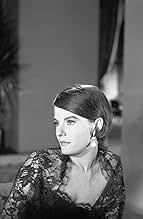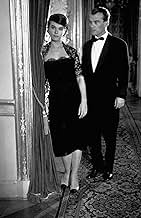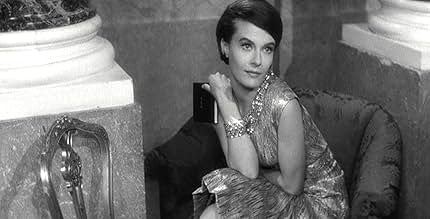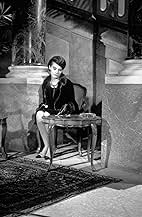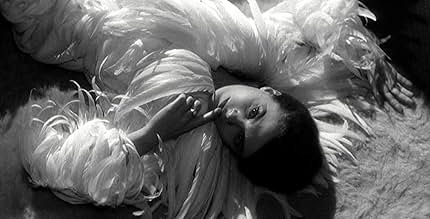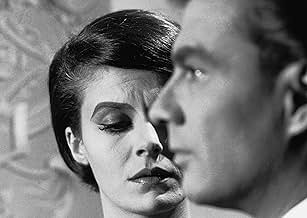VALUTAZIONE IMDb
7,6/10
26.295
LA TUA VALUTAZIONE
In uno strano e isolato castello, un uomo conosce una donna e insiste che si siano già incontrati.In uno strano e isolato castello, un uomo conosce una donna e insiste che si siano già incontrati.In uno strano e isolato castello, un uomo conosce una donna e insiste che si siano già incontrati.
- Regia
- Sceneggiatura
- Star
- Candidato a 1 Oscar
- 2 vittorie e 5 candidature totali
Karin Toeche-Mittler
- Un personnage de l'hôtel
- (as Karin Toche-Mittler)
Davide Montemurri
- Un personnage de l'hôtel
- (as Davide Montemuri)
Alan Edwards
- English Introduction
- (non citato nei titoli originali)
Recensioni in evidenza
My top 5: Alain Robbe-Grillet's "L'Imortelle" takes number 1 (by a landslide), and its a tie between David Lynch's Eraserhead & Blue Velvet for position 3, closely followed by Louis Buñuel's "Andalusian Dog" and Stan Brackage's "Dog Star Man" (which I would have rated number 1, except that I hated that so much I will not give it the satisfaction of being highly rated in any category!) and finally "Koyanisquatsi" which I defy any to explain or justify!
So - Last Year At Marienbad, in a nutshell, assume French Accent:
Verse 1: Man: I know you. Woman: You do not know me. Man: We were here. Woman: I was never here. Chorus: Man: Long strange monologue about the place that they are at, Marienbad. And how he has been here before and how she has been here before. Camera: panning about the ornate Marienbad mansion. Verse 2: (repeat verse 1 - add very interesting game of pick-up sticks) Chorus repeat verses 1 & 2
I think everyone should see this film. I don't know why. I have seen it numerous times. No, I have never seen it. Yes, I saw it last year! No, last year I did not see it. Yes, I saw it here, with me. Wait, I'm alone. Who am I talking to?
So - Last Year At Marienbad, in a nutshell, assume French Accent:
Verse 1: Man: I know you. Woman: You do not know me. Man: We were here. Woman: I was never here. Chorus: Man: Long strange monologue about the place that they are at, Marienbad. And how he has been here before and how she has been here before. Camera: panning about the ornate Marienbad mansion. Verse 2: (repeat verse 1 - add very interesting game of pick-up sticks) Chorus repeat verses 1 & 2
I think everyone should see this film. I don't know why. I have seen it numerous times. No, I have never seen it. Yes, I saw it last year! No, last year I did not see it. Yes, I saw it here, with me. Wait, I'm alone. Who am I talking to?
10debblyst
It's useless to speculate on the "real" meaning of this dream-like movie that is an investigation on the mechanics of memory, and has the absolutely unique feature of allowing as many interpretations as there have been viewers since it opened to change cinematic grammar, decades ago. I've seen it 4 or 5 times over a span of some 25 years and still find it sumptuously directed, endlessly fascinating, eerie, one of my favorite movies of all time, and above all, an O-R-I-G-I-N-A-L !! Every movie ever made since "Marienbad" has a direct or indirect debt to it, as it abandoned (and subverted) objective story-telling tradition and entered the realm of total subjectivity, challenging movie audiences' intelligence, attention and perception. Of course, it's not meant for viewers who associate movies with light entertainment, though anyone who's ever wondered about his/her own mnemonic idiosyncrasies -- the diffuse, random, inaccurate way we recall facts and sometimes even mix them with imagined stuff -- surely COULD relate to this masterpiece.
There has been many conjectures as to the subject and the plot. Well, if you want a good hint, let me give you a precious one: read the novella "La Jalousie" (Jealousy, 1957), by Alain Robbe-Grillet, who is also the screenwriter of "Marienbad". "La Jalousie" is the thematic and "ideological" inspiration for "Marienbad".
Robbe-Grillet (one of the top names of the French "Nouveau Roman" movement along with Nathalie Sarraute, Marguerite Duras, Michel Butor, etc), was a former agronomist/ mathematician (and his writing shows it) who became a writer/filmmaker with a very personal, geometrical, unemotional, descriptive style. The novella "La Jalousie", like most Nouveau Roman books, is essentially cinematic in their approach of characters and plot, functioning like a film camera, a non-opinionated unobtrusive observer, but insightfully revealing in its "detachment".
His novella "La Jalousie" is a fascinating, maze-like circular construction, in which beginning and end mingle many times over, each time from a different perspective, just like observing a house or a sculpture from different angles one at a time -- which means each angle is only partially accurate, revealing but a portion of the truth, while hiding another. The "observer/narrator" in the book (the husband, but written in the third person - "he") tries to locate in PLACE and TIME the precise moment in which the feeling of jealousy arises in him as he tries to find the extent of his wife's relationship with another man (a.k.a. the threesome in the film). Did an affair really happen? Is it yet going to happen? Or is it his imagination, his suspicion, just his jealous feeling? (btw, this is the same theme as Proust's incomparable masterpiece "La Prisonnière", treated in antipodal, totally psychological, but equally obsessive style).
As in most "Nouveau Roman" novels, the notion of TIME in "La Jalousie" (and also in "Marienbad") is transformed and deformed; the approach of the characters is non-psychological, meaning that thoughts and outbursts of emotion are not dealt with, only the description of places, words, gestures and actions. Everything (even a very strong feeling like the birth of jealousy) is apprehended only through the observation of external facts: small gestures, the position of a chair or a table, a glass found full or empty, an unexpected sound, the way the woman combs her hair or looks at herself in the mirror, a suddenly unusual way of getting up or sitting down which leads to the husband's perception that something has suddenly, dangerously, definitely changed.
Well, it made very much sense to me that language-experimentalist book-worm Alain Resnais (think of all of his movies which were based on literature) and his fascination with memory and the brain (think "Hiroshima Mon Amour", "Je t'Aime Je t'Aime" and "Mon Oncle d'Amérique") should venture in constructing this film in visual terms using the geometrical structure of the novel (hence the breathtaking serpentine camera movements), with no beginning or end, respecting its "external", non-psychological, non-motivational approach of the characters and the plot, never condescending to "explanations".
See the film and read the book! I'm sure that, if you've liked (or been baffled by) the film on a first viewing, you'll have many insights on a second viewing of this absorbing, totally fascinating movie after reading the book on which it is structurally/esthetically based. While it's not essential to do so, it could be kind of a bonus! What else can I say? A definitive, revolutionary, undisputed film classic - 10/10
There has been many conjectures as to the subject and the plot. Well, if you want a good hint, let me give you a precious one: read the novella "La Jalousie" (Jealousy, 1957), by Alain Robbe-Grillet, who is also the screenwriter of "Marienbad". "La Jalousie" is the thematic and "ideological" inspiration for "Marienbad".
Robbe-Grillet (one of the top names of the French "Nouveau Roman" movement along with Nathalie Sarraute, Marguerite Duras, Michel Butor, etc), was a former agronomist/ mathematician (and his writing shows it) who became a writer/filmmaker with a very personal, geometrical, unemotional, descriptive style. The novella "La Jalousie", like most Nouveau Roman books, is essentially cinematic in their approach of characters and plot, functioning like a film camera, a non-opinionated unobtrusive observer, but insightfully revealing in its "detachment".
His novella "La Jalousie" is a fascinating, maze-like circular construction, in which beginning and end mingle many times over, each time from a different perspective, just like observing a house or a sculpture from different angles one at a time -- which means each angle is only partially accurate, revealing but a portion of the truth, while hiding another. The "observer/narrator" in the book (the husband, but written in the third person - "he") tries to locate in PLACE and TIME the precise moment in which the feeling of jealousy arises in him as he tries to find the extent of his wife's relationship with another man (a.k.a. the threesome in the film). Did an affair really happen? Is it yet going to happen? Or is it his imagination, his suspicion, just his jealous feeling? (btw, this is the same theme as Proust's incomparable masterpiece "La Prisonnière", treated in antipodal, totally psychological, but equally obsessive style).
As in most "Nouveau Roman" novels, the notion of TIME in "La Jalousie" (and also in "Marienbad") is transformed and deformed; the approach of the characters is non-psychological, meaning that thoughts and outbursts of emotion are not dealt with, only the description of places, words, gestures and actions. Everything (even a very strong feeling like the birth of jealousy) is apprehended only through the observation of external facts: small gestures, the position of a chair or a table, a glass found full or empty, an unexpected sound, the way the woman combs her hair or looks at herself in the mirror, a suddenly unusual way of getting up or sitting down which leads to the husband's perception that something has suddenly, dangerously, definitely changed.
Well, it made very much sense to me that language-experimentalist book-worm Alain Resnais (think of all of his movies which were based on literature) and his fascination with memory and the brain (think "Hiroshima Mon Amour", "Je t'Aime Je t'Aime" and "Mon Oncle d'Amérique") should venture in constructing this film in visual terms using the geometrical structure of the novel (hence the breathtaking serpentine camera movements), with no beginning or end, respecting its "external", non-psychological, non-motivational approach of the characters and the plot, never condescending to "explanations".
See the film and read the book! I'm sure that, if you've liked (or been baffled by) the film on a first viewing, you'll have many insights on a second viewing of this absorbing, totally fascinating movie after reading the book on which it is structurally/esthetically based. While it's not essential to do so, it could be kind of a bonus! What else can I say? A definitive, revolutionary, undisputed film classic - 10/10
It would take a braver person than me to delineate what LAST YEAR AT MARIENBAD is `about', but as it is such an entirely thought provoking film, perhaps some sort of `meaning' can come from sharing these thoughts about it. Many people define it as cerebral and classical, but to me it is romantic and gothic. What is remarkable about the setting and the characters is that they are all so wealthy that they can rise above the concerns of ordinary mortals, only to find that this advantaged life brings other problems - of identity, purpose and values. They are strangely existentialist - the existentialism of great wealth - their small talk is intelligent, informed and stilted; they are all beautiful in the sense that money can partly buy beauty, and yet, in the process, they have lost human warmth, real sexual desire, and any purpose in life other than to drift on in their station in life. But desire is a respecter of nobody, and it is this element of human nature that haunts the corridors of the hotel like an invisible mist, and subconsciously their acutely civilised life-style which has bereaved them of something they no longer acknowledge or recognise and have deeply repressed - only to find it lingers on the fringes, confusing and disturbing them - spoiling everything; a depressive dissatisfaction. There is no joy, no enjoyment. The gardens become symbols of this desire to enslave, conquer and exile nature - formal, rigid and planned, and yet within the hotel, all around are decorative symbols of the chaotic and random aspects of nature. Everything appears to carry a symbol that needs to be interpreted - if it is there, it must have meaning, and if the Man says that they had arranged to elope together when they were at Marienbad, (or was it Marienbad, or elsewhere, and what does it matter?), how can the Woman be sure that this is not a ruse, made up to give immediate warning that we exile our emotions at our peril? That to acknowledge this for one second risks opening floodgates which will overwhelm and destroy? Or, that the ultimate expression of desire is death itself, as the film's closing line hints when the Man's voice speaks, over the night time silhouette of the hotel, of, `You.. and me.. together.. always.. in the night'. And it is an eternal night that we all subconsciously know lays in wait for us. The Great Leveller indeed! A remarkable film by any standards, and one which for me at least, is much darker and more sinister than has generally been recognised. But maybe it is just a springboard from which we can all set off on a journey guided by our own subconscious longings and dreads?
This mysterious film shows us a man and a woman in an extravagant and capacious hotel. The man insists that he had an affair with the lady last year in Marienbad (or was it somewhere else?) The woman denies it, and just wants the man to leave her alone. Perhaps the man did meet her, perhaps he didn't. Resnais puts the pieces there and lets us take what we can from it.
The beautiful looking establishment, complete with gardens of splendour, is an eerie setting for the film. The guests seem like they are in a trance most of the time. A card game is shown where a man cannot be beaten, he claims. The cinematography is brilliant. Dark, then white, giving a blinking effect at times; and constantly switching between different locations. The music throughout the film sounds like it's from an old church organ. I can understand why this film will put off some people, because it doesn't explain much, and does meander at a pedestrian pace. But approached in the right mood, and watched in a dark room, this is a film to appreciate. Peter Greenaway thinks so; the film was influential in the making of The Draughtsman's Contract, and is (supposedly) the film Greenaway most admires.
The beautiful looking establishment, complete with gardens of splendour, is an eerie setting for the film. The guests seem like they are in a trance most of the time. A card game is shown where a man cannot be beaten, he claims. The cinematography is brilliant. Dark, then white, giving a blinking effect at times; and constantly switching between different locations. The music throughout the film sounds like it's from an old church organ. I can understand why this film will put off some people, because it doesn't explain much, and does meander at a pedestrian pace. But approached in the right mood, and watched in a dark room, this is a film to appreciate. Peter Greenaway thinks so; the film was influential in the making of The Draughtsman's Contract, and is (supposedly) the film Greenaway most admires.
Years come and go, but "Marienbad" seems to remain the same--intriguing, challenging, stimulating, and moving. Alain Resnais' classic emerges as a timeless work, with a memorable score (utilizing unique pipe organ music) by Francis Seyrig and striking photography by Sacha Vierny. Delphine Seyrig and Giorgio Albertazzi play out their "roles" amidst dark corridors, empty halls, baroque statuary and geometric gardens. Time seems to stand still in the world of Resnais and Alain Robbe-Grillet, as our rapt attention is focused on its distinctive unfoldment. The meaning seems to be in the work and the solution in the problem. We simply take it in and allow it to speak for itself.
"Marienbad" is one of those films which requires a full- size widescreen and an excellent print to weave its haunting magic. It's a one-of-a-kind film experience, and one to which one can return again and again to enjoy as a mystery, romance or meditation.
"Marienbad" is one of those films which requires a full- size widescreen and an excellent print to weave its haunting magic. It's a one-of-a-kind film experience, and one to which one can return again and again to enjoy as a mystery, romance or meditation.
Lo sapevi?
- QuizThe match game in the movie is named as "Nim". In order to win the game there is only one tactic including a system called "Nim Sum". If both players use this tactic perfectly, then the owner of the first move will eventually lose. Due to the same reason, it is always disadvantageous to start the game first.
- BlooperExterior night scenes were shot day-for-night, but the sky and reflections of it were allowed in the frame, and they appear as bright white instead of black. This may have been intentional to emphasize the surreality of the film.
- Citazioni
[X wanders through the hotel's corridors cataloging items he sees]
X: Empty salons. Corridors. Salons. Doors. Doors. Salons. Empty chairs, deep armchairs, thick carpets. Heavy hangings. Stairs, steps. Steps, one after the other. Glass objects, objects still intact, empty glasses. A glass that falls, three, two, one, zero. Glass partition, letters.
- ConnessioniFeatured in Fejezetek a film történetéböl: A francia új hullám (1990)
I più visti
Accedi per valutare e creare un elenco di titoli salvati per ottenere consigli personalizzati
- How long is Last Year at Marienbad?Powered by Alexa
Dettagli
- Data di uscita
- Paesi di origine
- Sito ufficiale
- Lingua
- Celebre anche come
- Last Year at Marienbad
- Luoghi delle riprese
- Aziende produttrici
- Vedi altri crediti dell’azienda su IMDbPro
Botteghino
- Lordo Stati Uniti e Canada
- 207.917 USD
- Fine settimana di apertura Stati Uniti e Canada
- 15.485 USD
- 20 gen 2008
- Lordo in tutto il mondo
- 223.111 USD
- Tempo di esecuzione
- 1h 34min(94 min)
- Colore
- Mix di suoni
- Proporzioni
- 2.35 : 1
Contribuisci a questa pagina
Suggerisci una modifica o aggiungi i contenuti mancanti



